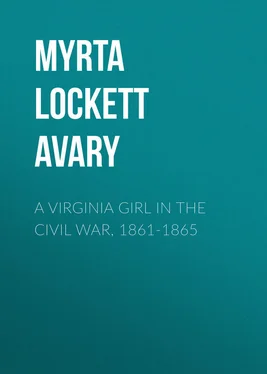Myrta Avary - A Virginia Girl in the Civil War, 1861-1865
Здесь есть возможность читать онлайн «Myrta Avary - A Virginia Girl in the Civil War, 1861-1865» — ознакомительный отрывок электронной книги совершенно бесплатно, а после прочтения отрывка купить полную версию. В некоторых случаях можно слушать аудио, скачать через торрент в формате fb2 и присутствует краткое содержание. Жанр: foreign_antique, foreign_prose, на английском языке. Описание произведения, (предисловие) а так же отзывы посетителей доступны на портале библиотеки ЛибКат.
- Название:A Virginia Girl in the Civil War, 1861-1865
- Автор:
- Жанр:
- Год:неизвестен
- ISBN:нет данных
- Рейтинг книги:5 / 5. Голосов: 1
-
Избранное:Добавить в избранное
- Отзывы:
-
Ваша оценка:
- 100
- 1
- 2
- 3
- 4
- 5
A Virginia Girl in the Civil War, 1861-1865: краткое содержание, описание и аннотация
Предлагаем к чтению аннотацию, описание, краткое содержание или предисловие (зависит от того, что написал сам автор книги «A Virginia Girl in the Civil War, 1861-1865»). Если вы не нашли необходимую информацию о книге — напишите в комментариях, мы постараемся отыскать её.
A Virginia Girl in the Civil War, 1861-1865 — читать онлайн ознакомительный отрывок
Ниже представлен текст книги, разбитый по страницам. Система сохранения места последней прочитанной страницы, позволяет с удобством читать онлайн бесплатно книгу «A Virginia Girl in the Civil War, 1861-1865», без необходимости каждый раз заново искать на чём Вы остановились. Поставьте закладку, и сможете в любой момент перейти на страницу, на которой закончили чтение.
Интервал:
Закладка:
Myrta Lockett Avary
A Virginia Girl in the Civil War, 1861-1865 / being a record of the actual experiences of the wife of / a confederate officer
INTRODUCTION
This history was told over the tea-cups. One winter, in the South, I had for my neighbor a gentle, little brown-haired lady, who spent many evenings at my fireside, as I at hers, where with bits of needlework in our hands we gossiped away as women will. I discovered in her an unconscious heroine, and her Civil War experiences made ever an interesting topic. Wishing to share with others the reminiscences she gave me, I seek to present them here in her own words. Just as they stand, they are, I believe, unique, possessing at once the charm of romance and the veracity of history. They supply a graphic, if artless, picture of the social life of one of the most interesting and dramatic periods of our national existence. The stories were not related in strict chronological sequence, but I have endeavored to arrange them in that way. Otherwise, I have made as few changes as possible. Out of deference to the wishes of living persons, her own and her husband’s real names have been suppressed and others substituted; in the case of a few of their close personal friends, and of some whose names would not be of special historical value, the same plan has been followed.
Those who read this book are admitted to the sacred councils of close friends, and I am sure they will turn with reverent fingers these pages of a sweet and pure woman’s life – a life on which, since those fireside talks of ours, the Death-Angel has set his seal.
Memoirs and journals written not because of their historical or political significance, but because they are to the writer the natural expression of what life has meant to him in the moment of living, have a value entirely apart from literary quality. They bring us close to the human soul – the human soul in undress. We find ourselves without preface or apology in personal, intimate relation with whatever makes the yesterday, to-day, to-morrow of the writer. When this current of events and conditions is impelled and directed by a vital and formative period in the history of a nation, we have only to follow its course to see what history can never show us, and what fiction can unfold to us only in part – how the people thought, felt, and lived who were not making history, or did not know that they were.
This is the essential value of A Virginia Girl in the Civil War: it shows us simply, sincerely, and unconsciously what life meant to an American woman during the vital and formative period of American history. That this American woman was also a Virginian with all a Virginian’s love for Virginia and loyalty to the South, gives to her record of those days that are still “the very fiber of us” a fidelity rarely found in studies of local color. Meanwhile, her grateful affection for the Union soldiers, officers and men, who served and shielded her, should lift this story to a place beyond the pale of sectional prejudice.
Myrta Lockett Avary.New York, November 1, 1902 .
CHAPTER I
HOME LIFE IN A SOUTHERN HARBOR
Many years ago I heard a prominent lawyer of Baltimore, who had just returned from a visit to Charleston, say that the Charlestonians were so in the habit of antedating everything with the Civil War that when he commented to one of them upon the beauty of the moonlight on the Battery, his answer was, “You should have seen it before the war.” I laughed, as everybody else did; but since then I have more than once caught myself echoing the sentiment of that Charleston citizen to visitors who exclaimed over the social delights of Norfolk. For really they know nothing about it – that is, about the real Norfolk.
Nobody does who can not remember, as I do, when her harbor was covered with shipping which floated flags of all nations, and her society was the society of the world. Milicent and I – there were only the two of us – were as familiar with foreign colors as with our own Red, White, and Blue, and happily grew up unconscious that a title had any right of precedence superior to that of youth, good breeding, good looks, and agreeability. That all of these gave instant way to the claims of age was one of the unalterable tenets handed down from generation to generation, and punctiliously observed in our manner and address to the older servants. The “uncle” and “aunty” and “mammy” that fall so oddly upon the ears of the present generation were with Southern children and young people the “straight and narrow” path that separated gentle birth and breeding from the vulgar and ignorant.
My girlhood was a happy one. My father was an officer of the Bank of Virginia, and, according to the custom that obtained, he lived over the bank. His young assistant, Walter H. Taylor (afterward adjutant to General R. E. Lee), was like a brother to Milicent and me. Father’s position and means, and the personal charm that left him and my mother cherished memories in Norfolk till to-day, drew around us a cultivated and cosmopolitan society. Our lives were made up of dance and song and moonlit sails. There were the Atlantic Ocean, the Roads, the bay, the James and Elizabeth rivers, meeting at our very door. And there were admirals, commodores, and captains whose good ships rode these waters, and who served two sovereigns – the nation whose flag they floated and a slim Virginia maiden. In all the gatherings, formal and informal, under our roof, naval and military uniforms predominated. Many men who later distinguished themselves in the Federal and Confederate armies, sat around our board and danced in our parlors; others holding high places in Eastern and European courts were numbered among our friends and acquaintances.
Some years after Commodore Perry through a skilful mixture of gunpowder and diplomacy had opened the ports of Japan to the commerce of all nations, Ito and Inouye – not then counts – had brought into existence an organized Japanese navy which sailed out of these same ports to the harbors of the world on tours of inspection. One of my most vivid memories is of the Japanese squadron which lay at anchor in our harbor, of the picturesque dress and manners of these Eastern strangers, and the polished courtesy of the two men whose names are now a part of history.
But the handsomest sailors I ever saw were the Prussians. When the Prussian navy was in its infancy two Prussian vessels, the frigate Gaefion and a corvette, dropped anchor in Norfolk harbor; they, too, were visiting the ports of different nations on tours of inspection. All the officers on these vessels, including the midshipmen, were noblemen, and all of them were magnificent-looking men. Then, too, their brilliant uniforms and the state and ceremony with which they invested every-day life made them altogether charming to a young, romantic girl. I shall never forget how they used to enter the room. They would appear in full regimentals, march in military form, the frigate’s captain in command, and salute Milicent before they permitted themselves to talk, dance, and sing. Upon leaving, the same order was observed. They went out into the hall, donned their hats, sword-belts, and swords, returned, saluted, and withdrew in military form. At this time I was a little girl who played on the piano for grown-up people to dance. On formal occasions we had military bands, but for the every-evening dance my playing did well enough. When the Prussians were our guests, one of them always sat by me while I played. Baron von der Golz, since Admiral of the German navy, was the gentleman who was oftenest kind enough to turn over my music. I play now, for my children to dance, a Prussian gallop he taught me, with some of the music I played for those officers, and some which they used to play when they took my place at the piano that I might have my share of the dancing. Another Prussian officer of whom I was very fond was Count von Monts, afterward Admiral of the German navy, Von der Golz succeeding at his death.
Читать дальшеИнтервал:
Закладка:
Похожие книги на «A Virginia Girl in the Civil War, 1861-1865»
Представляем Вашему вниманию похожие книги на «A Virginia Girl in the Civil War, 1861-1865» списком для выбора. Мы отобрали схожую по названию и смыслу литературу в надежде предоставить читателям больше вариантов отыскать новые, интересные, ещё непрочитанные произведения.
Обсуждение, отзывы о книге «A Virginia Girl in the Civil War, 1861-1865» и просто собственные мнения читателей. Оставьте ваши комментарии, напишите, что Вы думаете о произведении, его смысле или главных героях. Укажите что конкретно понравилось, а что нет, и почему Вы так считаете.












